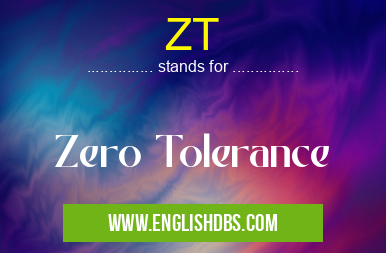What does ZT mean in MILITARY
ZT stands for Zero Tolerance. This term is used to describe an uncompromising attitude of intolerance towards any behavior or action deemed unacceptable. Zero tolerance policies have been increasingly embraced in many different areas, ranging from education to law enforcement. It generally means that any transgression will result in certain consequences without any room for exceptions or negotiation.

ZT meaning in Military in Governmental
ZT mostly used in an acronym Military in Category Governmental that means Zero Tolerance
Shorthand: ZT,
Full Form: Zero Tolerance
For more information of "Zero Tolerance", see the section below.
» Governmental » Military
Essential Questions and Answers on Zero Tolerance in "GOVERNMENTAL»MILITARY"
What is the meaning of Zero Tolerance?
Zero Tolerance (ZT) refers to an attitude of intolerance towards actions or behaviors which are not considered socially acceptable. It usually means that if someone transgresses, there will be a predetermined consequence with no room for negotiation or exceptions.
How do zero tolerance policies work in practice?
In practical terms, zero tolerance policies involve implementing firm rules and regulations that are universally applicable to all people. No one should be exempt from these rules, and anyone breaking them should face the predetermined consequence immediately and with no leniency.
Where are zero tolerance policies used?
Zero tolerance policies have been embraced in a variety of different contexts including education, workplace safety, and law enforcement. These policies are often used when addressing violations such as drug use or physical violence in order to prevent further misconduct.
Are there any drawbacks to using zero tolerance policies?
Although zero tolerance policies can effectively reduce instances of unacceptable behavior, they can also make it difficult to account for extenuating circumstances such as mental health issues or external pressures which can contribute to someone's behavior. Critics often argue that this one-size-fits-all approach doesn't take into consideration individual cases and could potentially lead to an overuse of punishment instead of considering discrepancies on a case by case basis.
Are there alternatives to the use of zero tolerance policies?
Yes, alternatives do exist which allow for more flexibility depending on the context and situation at hand. Other approaches include restorative justice where people involved in a dispute meet with each other and decide on measures for repair as well as harm reduction which seeks to reduce the risk associated with behavior rather than outlawing it altogether.
Final Words:
In short, ZT stands for Zero Tolerance and describes an attitude of uncompromising intolerance towards undesirable behavior or action which generally leads to immediate consequences without any room for exceptions or negotiation. While Zero Tolerance has become increasingly widespread across many different sectors, its inflexible nature has come under criticism meaning alternative approaches such as restorative justice may need to be taken instead.
ZT also stands for: |
|
| All stands for ZT |
